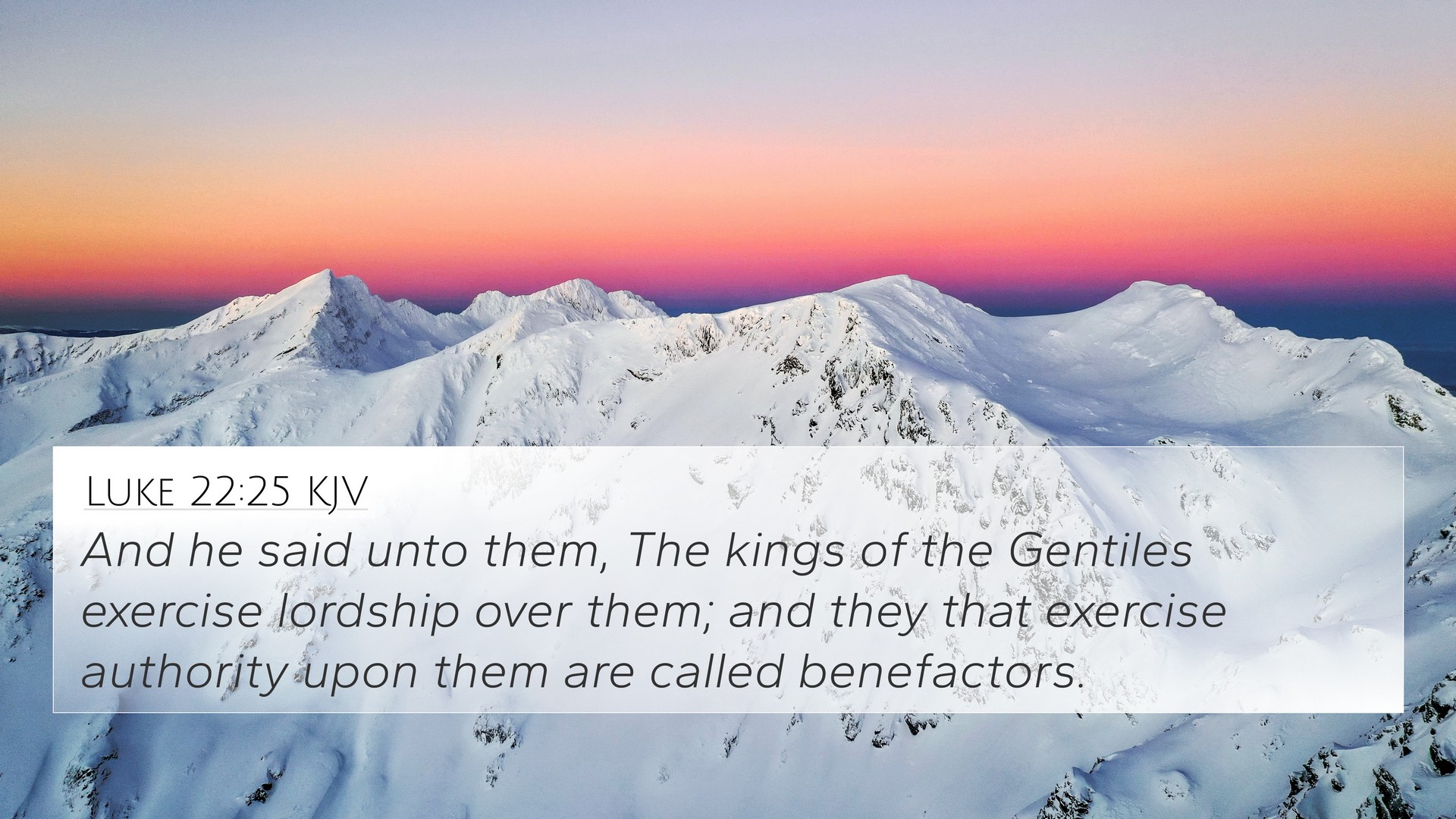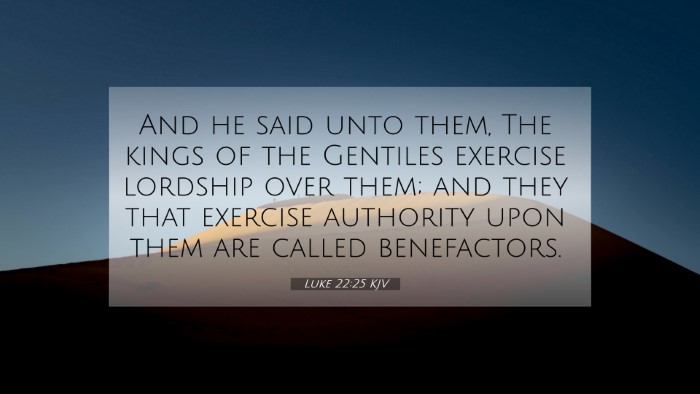Understanding Luke 22:25
In Luke 22:25, Jesus addresses His disciples regarding the nature of greatness and authority, stating:
"But he said unto them, The kings of the Gentiles exercise lordship over them; and they that exercise authority upon them are called benefactors."
This passage reveals the contrast between worldly leadership and the model of leadership that Jesus exemplifies. Let's explore its meaning through insights from public domain commentaries.
Context and Significance
The context of this verse is pivotal. It occurs during the Last Supper, when Jesus prepares His disciples for the impending events of His crucifixion. At this moment, the disciples are disputing about who among them should be regarded as the greatest (Luke 22:24).
Insights from Commentaries
-
Matthew Henry:
Henry emphasizes that the leadership style of the Gentile rulers is characterized by oppression and authority, often seeking honor and position rather than serving. True greatness, according to Christ, lies not in authority but in humility and service to others.
-
Albert Barnes:
Barnes remarks that Jesus draws a distinction between the political rulers who dominate through power and those who are called benefactors. He indicates that titles of respect among worldly leaders often hide a lack of genuine virtue and service.
-
Adam Clarke:
Clarke highlights that Jesus contrasts His kingdom's principles with those of the existing order. He points out that true authority in Christ's eyes is demonstrated through service rather than through tyranny or domination, calling His followers to a revolutionary understanding of leadership.
Thematic Connections with Other Bible Verses
This verse connects with various other biblical themes and verses that emphasize leadership, humility, and service. Here are some relevant cross-references:
- Mark 10:42-45: "But Jesus called them to him and said, You know that those who are considered rulers of the Gentiles lord it over them, and their great ones exercise authority over them. But it shall not be so among you." This passage reinforces the message of servant leadership.
- Matthew 20:26-28: "Whoever wants to become great among you must be your servant." This highlights Jesus' call to His disciples to adopt a servant's heart.
- Philippians 2:3-4: "Do nothing out of selfish ambition or vain conceit. Rather, in humility value others above yourselves." This amplifies the call to humility in leadership.
- 1 Peter 5:3: "Not domineering over those in your charge, but being examples to the flock." Emphasizing the model of leading by example.
- Luke 9:48: "For he that is least among you all, the same shall be great." This reinforces the principle of humility as a pathway to greatness.
- John 13:13-15: Jesus washes the disciples' feet, illustrating the ultimate act of service and servant leadership.
- Luke 14:11: "For everyone who exalts himself will be humbled, and he who humbles himself will be exalted." This links humility directly to divine elevation.
- Proverbs 18:12: "Before destruction a man's heart is haughty, but humility comes before honor." A wisdom verse on the contrast of pride and humility.
- James 4:10: "Humble yourselves before the Lord, and he will exalt you." This underscores the principle that humility precedes honor in the Lord’s sight.
- Matthew 23:11-12: "The greatest among you shall be your servant." This finalizes the understanding of greatness in God’s kingdom.
Application of Meaning
Understanding Luke 22:25 not only informs readers about the nature of God's kingdom but also challenges them to reflect on their own attitudes towards power and service. The propensity of humanity to seek status and recognition can easily distort one’s view of leadership. Jesus calls His followers to the inversion of normal values—where the last will be first, and the servant will be the greatest.
Tools for Further Study
For those looking to dive deeper into cross-references and thematic studies in the Bible, here are some resources that can enhance your understanding:
- Bible Concordance: A tool that provides a list of words and their occurrences to identify related verses.
- Bible Cross-reference Guide: Systematic resources that map connections between various scripture verses.
- Bible Chain References: A method of linking verses that elaborately connects themes across scripture.
- Bible Reference Resources: Includes commentaries, dictionaries, and study guides that can shed light on inter-Biblical concepts.
- Cross-referencing Bible Study Methods: Guides on how to approach the Bible using a cross-referencing ideology for deeper insights.
Conclusion
Luke 22:25 is a profound statement about the radical redefinition of power and authority in the Christian faith. By embracing the principles of service and humility, believers can transcend the worldly understanding of greatness and truly reflect Christ’s love and leadership. Cross-referencing related Bible verses further enriches this understanding, inviting continual reflection on how one's life mirrors the teachings of Jesus.




